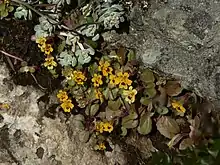| Erythranthe primuloides | |
|---|---|
 | |
| Scientific classification | |
| Kingdom: | Plantae |
| Clade: | Tracheophytes |
| Clade: | Angiosperms |
| Clade: | Eudicots |
| Clade: | Asterids |
| Order: | Lamiales |
| Family: | Phrymaceae |
| Genus: | Erythranthe |
| Species: | E. primuloides |
| Binomial name | |
| Erythranthe primuloides | |
Erythranthe primuloides is a Western United States perennial plant in the lopseed family (Phrymaceae), known by the common name primrose monkeyflower.[1] It was formerly known as Mimulus primuloides.[2][3][4][5]
Range and habitat
It is native to the western United States, including California. It grows in wet habitat in mountains and plateau areas, such as stream banks. In the eastern Sierra Nevada , it can be found in a very wide range of elevations, from 2,000 to 11,000 feet (610 to 3,350 m).[1]
Description
Erythranthe primuloides is a perennial herb growing in low patches or mosslike mats and spreading via rhizome and stolon.
The stem is no more than about 12 centimeters long. The oppositely arranged leaves are variable in shape, variable in color from green to purple-green, shaggy-hairy to hairless, and up to 5 centimeters long.
The flower arises on an erect pedicel. The tubular base of the flower is encapsulated in a hairless calyx of sepals. The bright yellow flower is up to 2 centimeters long. It is divided into an upper lip with two lobes and a lower lip with three. Each of the three lower lobes are usually dotted with red.
References
- 1 2 Sierra Nevada Wildflowers, Karen Wiese, 2nd Ed., 2013, p. 134
- ↑ Barker, W.R.; Nesom, G.L.; Beardsley, P.M.; Fraga, N.S. (2012), "A taxonomic conspectus of Phrymaceae: A narrowed circumscriptions for Mimulus, new and resurrected genera, and new names and combinations" (PDF), Phytoneuron, 2012–39: 1–60
- ↑ Beardsley, P. M.; Yen, Alan; Olmstead, R. G. (2003). "AFLP Phylogeny of Mimulus Section Erythranthe and the Evolution of Hummingbird Pollination". Evolution. 57 (6): 1397–1410. doi:10.1554/02-086. JSTOR 3448862. PMID 12894947. S2CID 198154155.
- ↑ Beardsley, P. M.; Olmstead, R. G. (2002). "Redefining Phrymaceae: the placement of Mimulus, tribe Mimuleae, and Phryma". American Journal of Botany. 89 (7): 1093–1102. doi:10.3732/ajb.89.7.1093. JSTOR 4122195. PMID 21665709.
- ↑ Beardsley, P. M.; Schoenig, Steve E.; Whittall, Justen B.; Olmstead, Richard G. (2004). "Patterns of Evolution in Western North American Mimulus (Phrymaceae)". American Journal of Botany. 91 (3): 474–4890. doi:10.3732/ajb.91.3.474. JSTOR 4123743. PMID 21653403.